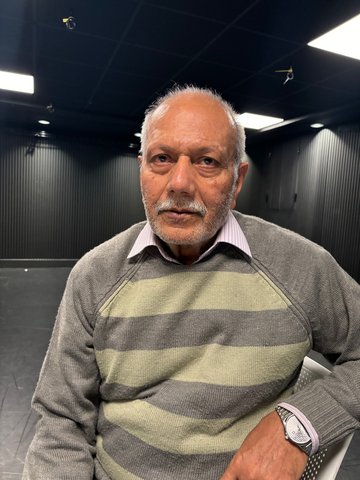
Kantilal Modasia
Kantilal Modasia was born in 1950, Mombasa (Kenya), and on arriving in Britain took part in the Grunwick dispute
Part of the South Asian Britain oral history collection
About
Born in 1950, Mombasa (Kenya), Kantilal Modasia arrived in Britain in the 1970s. His family were part of a wider group who experienced multiple migration, coming from Kenya and India. On arrival in Britain, he took up work in the Grunwick photo processing plant (north London). He was subsequently involved in the Grunwick dispute. He shares his memories of the dispute, picketing, as well as unfair pay conditions. He describes taking his young daughter to the picket line whilst his wife worked, and attending the Apollo Club. Later, Kantilal also took part in the Gate Gourmet dispute.
Kantilal was interviewed in the presence of his wife and daughter, and at the time of interview had early onset dementia and hearing loss.
The full interviews recorded for 'Remaking Britain', for the South Asian Britain: Connecting Histories digital resource, are available at the British Library under collection reference C2047.
Listen to Kantilal talking about the Grunwick Dispute.
Interview conducted by Maya Parmar, 6 November 2024.
MP: So, what happened at Grunwick? [Translates to Gujarati.] Grunwick. What happened?
KM: You know on Chapter Road, they were on a strike. At that time, they said, 'Oh come out, come out, come out.' They wanted to take a union. And union…they wanted to put union in the company. But unfortunately, they couldn't do. And that was a fight between...between Conservative and the Labour Party. I don't know why.
MP: Do you remember that day when you first left the factory and went on strike? Were you there?
KM: Yeah.
MP: What happened?
KM: Then we went to Apollo Club. Yeah. All the strikers went down there. We were doing picketing, night picketing. And it was so snow. But still in the snow, we were picketing out that night. And then Arthur Scargill said, ‘We'll come to help you’.
MP: I remember.
KM: Yeah. He said, 'I'm bringing my army'. But it couldn't do anything. The post office tried to help to block the...to block the, this one.
MP: To block the post?
KM: Yeah, that one. But in meantime, they want...the rent on this one. They said we are ready to go to jail, the post office people. So they couldn't do. And then...but I don't understand why it went into between Labour Party and Conservative Party. Maggie was there. Margaret Thatcher was there. So it all went like this, this way. You see, it shouldn't go. Only thing was, we wanted union to be formed, to be going in, that's it. They said no. They knew that when the union are going inside, there will be all the problems. Yeah.
MP: What sort of problems do you think they thought?
KM: Eh?
MP: What sort of problems?
KM: What cause a problem?
MP: What sort of problems were they worried about?
KM: Who, the company? Yeah, they were worried once if the union goes in there, there'll been the problems, about the wages, about these things.
MP: What were the wages like?
KM: It was £28.
MP: A week? A month?
KM: A week.
MP: And was this a lot? A little?
KM: Little.
MP: And was it £28 for everybody, who worked at Grunwick?
KM: Yeah. One thing is there, there...there was a divide and rule, white guy get a lot of money, then Indian gets, then the Black guy gets. You see, it's like anywhere [inaudible 4:30].
MP: So, did the white people earn £28 a week as well?
KM: No, supervisor wasn't, he was getting more. And Indian was getting less. And then on the last one, the Black guy used to get.
All audio and video clips and their transcriptions are excluded from creative commons licensing. This material cannot be reused or published elsewhere without prior agreement. Please address any permissions requests to: remaking-britain-project@bristol.ac.uk
